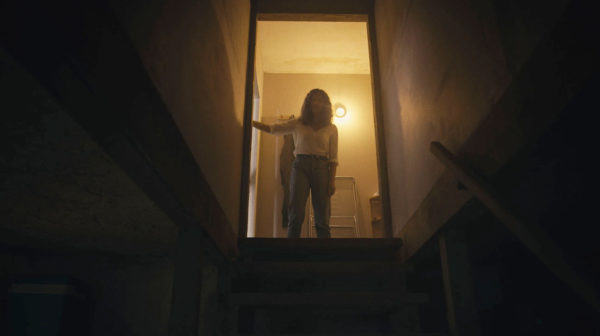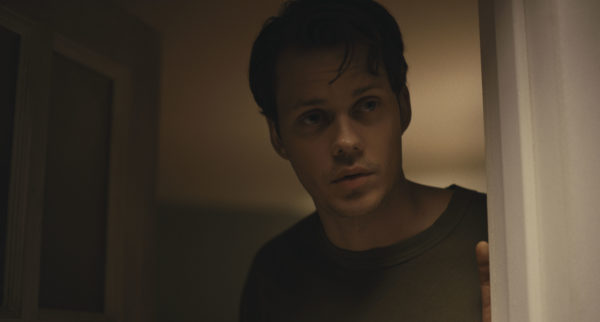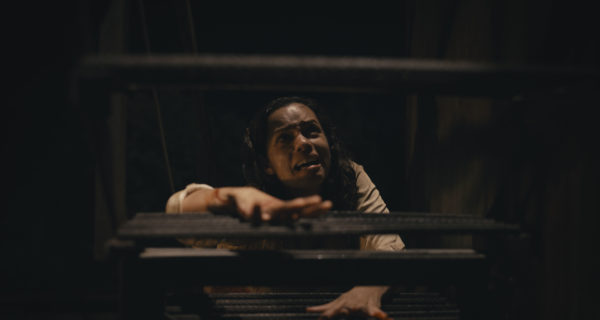
A double-booked Air BnB is the inciting incident in Barbarian, a twisty thriller that delivers the scares and gore.
Barbarian is one of those films where – ideally – audiences would go in as cold as possible and just experience the wild batshit that writer/director Zach Cregger has cooked up. Unfortunately the job description demands I expand beyond hyperbolic pull quotes, so here’s a review if that’s not quite enough to sway you.
The film opens with Tess Marshall (Georgina Campbell, Black Mirror) arriving at a dark house late at night. She’s renting the cute little one bedroom place while she endeavours to leave behind a toxic relationship and simultaneously interview for a documentarian’s research assistant gig in Detroit. Unfortunately as Tess struggles through the rain with her bags and double checks the confirmation email, she discovers that the key in the lock box is missing. Tired, frustrated and wet, she’s about to leave when a light turns on and a man, Keith (Bill Skarsgård, IT) opens the door.
It turns out that Keith also booked the house (on a different app), but he invites Tess in while she looks up hotels because the neighbourhood isn’t great. She’s apprehensive and guarded, making smart and rational decisions that horror characters tend to be critiqued for. When her options don’t pan out and Keith offers her the bedroom, you can almost see the warning bell go off in her mind: sure, he seems nice, but can he be trusted?
Barbarian gets a lot of mileage out of Tess’ uncertainty in the first act. Casting Skarsgård is brilliant because he can not only alternate between cute and threatening at the drop of a hat, but he already has a built in persona courtesy of his previous horror roles.
The more Keith and Tess interact, however, the more that apprehension melts away. The pair have an easy chemistry, particularly as the night wears on and the wine comes out and they discover they have more in common than just a double booked rental.
This *is* still a horror film, however, so things aren’t entirely as they seem. When she goes to bed, Tess forgets to lock the bedroom door and awakens to find it ajar. And then there’s the creepy basement – with its unexpected tendency to lock inhabitants on the wrong side, and the strange cord that opens a door into a dark corridor built into the wall.

Credit Cregger for keeping the unexpected thrills coming through the first and most of the second act. Each time you think Tess has reached her limit, Cregger finds an unnerving new avenue to up the ante. At one point a reveal is accompanied by Tess’ perfectly timed “Nope!” which – just like Jordan Peele’s film of the same name from earlier this year – mirrors the audience’s response.
Aiding Cregger on the well-shot film is cinematographer Zach Kuperstein, who keeps the camera trained in close-ups of significant objects like doorknobs, blood stains and TVs, while editor Joe Murphy works both the jump scares and the comedic transitions between acts like a pro.
Arguably the film’s greatest asset, however, is the music by Anna Drubich, which sounds like a threatening marriage between human moans, animal wails and orchestral score. As characters run through dark corridors in haste, lit by failing flashlights and tiny phone screens, it is Drubich’s score and musical stings that do the heavy lifting.

Not everything works, however. In addition to Campbell and Skarsgård, Justin Long‘s sleazy director AJ is also a key player and while the actor nails the diminutive swagger of a shitty dude, the narrative device that facilitates new actors entering into the film is a repeated visual motif that works once, but is used twice. The effect actually undercuts the tension in a way that initially felt playful, but feels frustrating the second time around.
Then there’s the awkwardly incorporated social commentary that is muddled at best.
It’s hardly surprising that a film set in Detroit includes references to gentrification and urban decay. This idea packs a visual wallop when Tess exits the house in the morning and surveys the surrounding neighbourhood, which is all dilapidated, run-down and/or abandoned. But later arguments about how this came to be feel slight, verging on expository backstory that Barbarian isn’t committed to exploring beyond mentioning it.
There’s also some awkward gender politics stuff. Again, Tess’ first act uncertainty around Keith feels completely authentic and far too relatable, whereas AJ’s whole “arc” is messy and unsatisfying. Barbarian seems to want to say something about men, gendered violence and poverty (and possibly the intersection of the three), but whatever that message is, it gets lost in the film’s preposterous (albeit fun and gory) climax that eschews the more grounded horrors of the first half..
The Bottom Line: Barbarian is a well-constructed mix of scares, surprises and gore that works best when it is thrilling audiences with secret passages and dark corridors (ie: the first half). The back half, while still enjoyable, introduces themes and storylines that Cregger doesn’t fully explore and while the gory climax is suitably over the top, the suspension of disbelief required runs counter to the more unsettling early parts of the film. 4/5
Barbarian is in theaters Sept 9, 2022